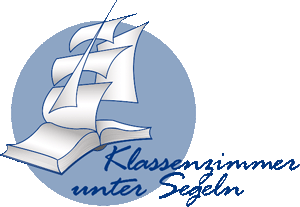Pedagogical background
In KUS, progressive educational conceptions are combined with contemporary theoretical models of education and ICT-based (Information and Communication Technologies) teaching and learning methods. The educational experience offered by KUS includes concepts of modern didactics and developmental psychology. The young participants are asked to take part in their own personal development and education through interaction with the world surrounding them.
The requirements of the public school system and the curricula of year 10 of the eight-year secondary school program in Germany form the basis for the concept to make sure that the students are able to continue with their studies after the voyage.
Goals
KUS intends to strengthen young people’s independence, their ability to act on their own initiative and to take on responsibility in a complex and globalised world. KUS provides support for the juveniles‘ journey to maturity and the development of their own personality.
Goals of KUS in detail:
- Development and support of social and personal skills
Sharing a limited space on board for living and working demands and encourages the students‘ capabilities for respect, tolerance and conflict handling as well as their development of team spirit, initiative, independence and responsibility. A ship offers extraordinarily adequate conditions for this since learning, living and working all take place in the same location. - Increase in motivation
Realistic and situational tasks which are closely related and significant to the students‘ lives are meant to increase their motivation. - Scientific techniques
Students are introduced to scientific techniques to prepare them for higher education. - Democratic education and political formation
The participants experience democratic structures within the project and different governmental structures in various countries. KUS implies numerous democratic elements that give students the possibility of self- and codetermination. - Insight into different professional fields
The young people collaborate actively and responsively in every field of activity aboard and ashore. They get an insight into different professional fields, learn the skills they need for future jobs and can gain self-confidence and self-assurance by successfully accomplishing their duties and tasks. - Reassessment of personal values and standards
The experience of restrictions on board (in terms of space and resources) and stopovers in foreign countries with different cultural backgrounds enable the students to reassess their personal values and standards. - Cross-cultural education
Staying in foreign countries for several weeks enables the adolescents to get to know and understand different cultures, to overcome prejudices and to reflect on their own culture. They learn how to deal with cultural differences, are able to apply and consolidate their foreign language skills and build up international friendships.
These aims comply with the requirements of a holistic education that include the encouragement of a wide range of skills such as social behaviour, self-perception and professional skills and qualifications. Living, learning and working are not separated – as it is commonly found in schools – but related to each other. Here, maturity and responsibility are skills gained in everyday life.

